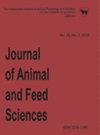Does humate supplementation affect ciliate population and fermentation parameters in the sheep rumen?
IF 1.4
4区 农林科学
Q3 AGRICULTURE, DAIRY & ANIMAL SCIENCE
引用次数: 1
Abstract
. The objective of the study was to examine the effect of supplementing sheep diets with humic substances (HS) on the number of protozoa and short chain fatty acid and methane concentrations in the rumen. The experiment was carried out in three rumen-fistulated sheep. The control (CON) ration was composed of 59.70% hay and 40.30% concentrate. Two experimental diets consisting of the same components were supplemented with two doses of humic substrates, 10 (HS10) or 20 (HS20) g/day/animal. The population of total protozoa and the genera Entodinium and Isotricha in the rumen was the most abundant before feeding (0 h) and decreased 2 and 4 h after receiving the diets. The populations of total protozoa and the genus Entodinum in the rumen were more abundant 2 h after administration of HS10 and HS20 compared to CON. The counts of these groups of protozoa increased 8 h after feeding HS10 compared to CON and HS20. An interaction trend (sampling time × treatment) was detected in terms of the number of Isotricha spp. in the rumen. The postprandial (2 and 4 h) pH of the rumen was lower than 0 h and 8 h after feeding CON and HS. Short chain fatty acid concentration was higher 2 and 4 h after feeding compared to 0 h and 8 h postprandial. An interaction trend was as assessed based on acetic acid levels; the highest was observed 4 h after feeding HS20 and the lowest 8 h after feeding HS10. Butyrate concentration was lower 8 h after feeding compared to 2 and 4 h postprandial levels for sheep fed the CON and HS10 diets. Branched chain acid production was the lowest 8 h after feeding compared to 0 h and 2 h after HS10 administration. An interaction trend was observed for methane levels; the highest was showed 4 h after feeding HS20 and the lowest 8 h after feeding HS10 diets. HS supplemented to sheep diets increased the abundance of total protozoa and the genera Entodinium and Isotricha in the rumen. It seemed that humates could modify the production of acetate and methane in the rumen, as slight increases in these parameters were observed. This suggests that humic substances can intensify methanogenesis in the rumen.补充腐殖酸盐是否会影响绵羊瘤胃中的纤毛虫种群和发酵参数?
本研究的目的是检验在绵羊日粮中添加腐殖物质(HS)对瘤胃中原生动物数量、短链脂肪酸和甲烷浓度的影响。本试验在三只瘤胃造瘘绵羊身上进行。对照日粮由59.70%的干草和40.30%的精饲料组成。由相同成分组成的两种实验日粮补充两种剂量的腐殖基质,10(HS10)或20(HS20)g/天/只动物。瘤胃中的总原生动物以及虫属和异虫属的种群在饲喂前(0 h)最为丰富,在接受日粮后2和4 h减少。与CON相比,HS10和HS20给药后2小时瘤胃中的总原生动物和虫属数量更丰富。与CON和HS20相比,喂食HS10后8小时,这两组原生动物的数量增加。根据瘤胃中Isotricha spp.的数量检测到相互作用趋势(采样时间×处理)。饲喂CON和HS后,瘤胃的餐后(2和4h)pH分别低于0h和8h。与餐后0小时和8小时相比,喂食后2小时和4小时的短链脂肪酸浓度更高。根据乙酸水平评估了相互作用趋势;在饲喂HS20后4h观察到最高,在饲喂HS10后8h观察到最低。与喂食CON和HS10日粮的绵羊餐后2和4小时的水平相比,喂食后8小时的丁酸盐浓度较低。与HS10给药后0小时和2小时相比,喂食后8小时支链酸产量最低。观察到甲烷水平的相互作用趋势;饲喂HS20后4h最高,饲喂HS10后8h最低。在绵羊日粮中添加HS可增加瘤胃中原生动物总数以及Entodinium属和Isotricha属的丰度。腐殖酸盐似乎可以改变瘤胃中乙酸盐和甲烷的产生,因为观察到这些参数略有增加。这表明腐殖物质可以增强瘤胃中的甲烷生成。
本文章由计算机程序翻译,如有差异,请以英文原文为准。
求助全文
约1分钟内获得全文
求助全文
来源期刊

Journal of Animal and Feed Sciences
农林科学-奶制品与动物科学
CiteScore
2.10
自引率
0.00%
发文量
42
审稿时长
3 months
期刊介绍:
Journal of Animal and Feed Sciences (JAFS, J. Anim. Feed Sci.) has been published by the Kielanowski Institute of Animal Physiology and Nutrition, Polish Academy of Sciences in Jabłonna (Poland) since 1991. It is a continuation of the Polish-language journal Roczniki Nauk Rolniczych. Seria B, Zootechniczna published by the Polish Academy of Sciences since 1969.
JAFS is an international scientific journal published quarterly, about 40 papers per year including original papers, short communications and occasionally reviews. All papers are peer-reviewed and related to basic and applied researches in the field of animal breeding and genetics, physiology of nutrition, animal feeding, feed technology and food preservation. The journal distinguishes the multidisciplinary nature of physiological and nutritional sciences and so includes papers specialized in all fields connected with animal well-being, including molecular and cell biology and the emerging area of genetics.
 求助内容:
求助内容: 应助结果提醒方式:
应助结果提醒方式:


